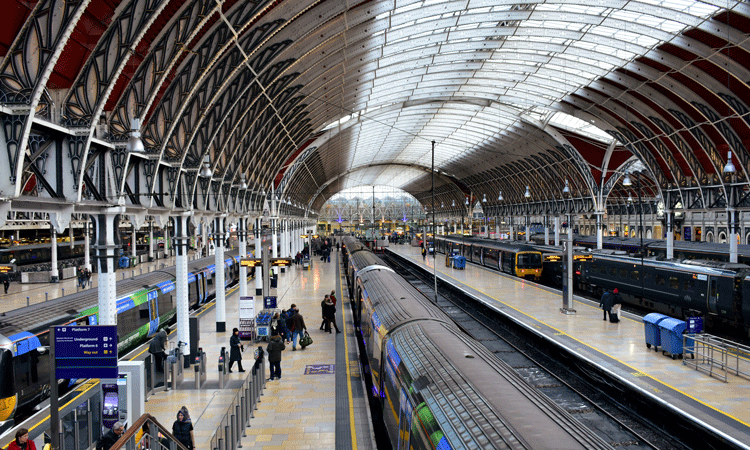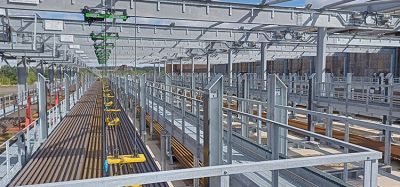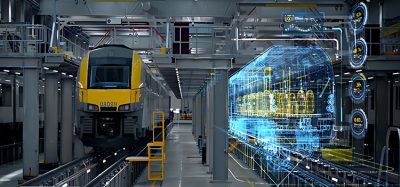New report highlights the economic value of the UK’s railway industry
Posted: 16 September 2021 | Global Railway Review | No comments yet
A new report, commissioned by the Railway Industry Association (RIA), highlights the economic value of the UK railway industry and how rail could be sector leader for the UK’s economic recovery.


The report, commissioned by the Railway Industry Association (RIA), shows UK rail as a major economic sector, driving growth, investment, and jobs right across the UK. With the government now looking for sectors which can help the country bounce back better, it further highlights how the sector can lead the economic recovery post-COVID-19.
Oxford Economics found that in 2019, the latest point where economic data is available, the rail industry supported:
- £43 billion GVA in economic growth, compared to £36.4 billion in 2016.
- 710,000 jobs, compared to 600,000 in 2016.
- £14 billion in tax revenue each year, compared to £11 billion in 2016.
- For every £1 spent in rail, £2.50 of income was generated in the wider economy, compared to £2.20 in 2016.
The report also looks at future scenarios for rail investment, based on National Infrastructure Commission (NIC) research. For example, using the NIC scenarios, the report shows that if rail investment is increased by 50 per cent, the rail sector would contribute to the economy an additional £5.6 billion per year between 2025 and 2029, with an extra 104,000 individuals employed in the industry as a result.
Darren Caplan, Chief Executive of the Railway Industry Association (RIA), said: “This new research by Oxford Economics reveals that, pre-COVID-19 pandemic, the railway industry was growing and supporting even more jobs and GVA than just a few years earlier. In 2016, every pound spent in rail generated £2.20 of spending in the wider economy, yet by 2019 this had risen to £2.50. This shows that rail is not just an important sector, but is also crucial for UK plc more widely, its economy and connectivity.
“As the government seeks to build back better – with a growing economy, which levels-up, is green, and which helps promote global Britain – it should look no further than the UK railway industry. This report by Oxford Economics shows a bourgeoning rail sector before the COVID-19 pandemic and how rail can provide more economic growth in the future. As passengers now return to the network, we should be optimistic about rail’s ability to help with the recovery. With the right government policy and support, UK rail can continue to be the economic powerhouse the UK will need in the months and years to come.”
“We are delighted to produce this economic research on the value of rail for the Railway Industry Association, showing that the rail industry is a sizeable sector supporting jobs and economic value across the UK,” commented Doug Godden, Lead Economist at Oxford Economics. “The report shows that the sector had grown significantly from 2016 to 2019 and that, under the National Infrastructure Commission’s scenarios, the industry could produce even more economic value through further rail investment.”
Huw Merriman MP, Chair of the Transport Select Committee, welcomed the report: “It’s incredibly timely because effectively we need to do this all over again, when it comes to the investment, we’ve seen from rail over the last 20 years or so – the doubling of passenger numbers since privatisation. Now more than ever, we need that same zeal and enthusiasm and dynamism which the industry has brought to deliver that success, so we can now pick back up after the COVID-19 pandemic has laid rail numbers low.”
Nick Crossfield, Alstom Managing Director, UK&I said: “We welcome, but are not surprised, by the report’s findings. As the UK’s leading rail sector supplier, we know just how important the rail industry is to transport, to the wider economy and to a low carbon future”.
“It is so important that the value of the UK rail system is fully understood across the industry and in government,” added Kelly Warburton, Unipart Rail’s Managing Director UK Rail and EU. “This new report provides weight to the argument that investment is not only required but is necessary to support the future prosperity of multiple sectors outside rail and the wider country. We fully support this important contribution to the debate and commit to supporting the growth of the industry over the coming years through our services that accelerate progress, address environmental challenges and introduces more digital solutions.”
James Quinnell, Chief Commercial Officer, Colas Rail, said: “This timely research confirms and quantifies with hard data the central role the rail network plays in our country’s progress. A thriving railway which puts passengers and freight users at its heart is not only a great business case for investment but, is critical to the whole economy and wider society.”
“By evaluating the pre-Covid growth of the industry, this report highlights the critical role rail can play in driving economy recovery across all regions of the UK,” commented Lizi Stewart, Managing Director, UK Transportation at Atkins.
“As the rail industry continues to grow, there is a great opportunity for ED&I to be placed at its core, to deliver a sustainable workforce to tackle current and future issues such as net-zero and the continued COVID-19 recovery. Atkins welcomes the findings of this report, and we look forward to supporting industry and the government to help the rail industry connect people, businesses and communities, creating vibrant economies where people can thrive,” further added Lizi.
Related topics
Cargo, Freight & Heavy-Haul, Coronavirus/COVID-19, Funding & Finance, Passenger Experience/Satisfaction, Regulation & Legislation, Sustainability/Decarbonisation, The Workforce
Related organisations
Alstom, Atkins, Colas Rail, National Infrastructure Commission (NIC), Railway Industry Association (RIA), Transport Select Committee, UK&I, Unipart Rail
Related regions
Related people
Darren Caplan, Doug Godden, Huw Merriman, James Quinnell, Kelly Warburton, Lizi Stewart, Nick Crossfield








